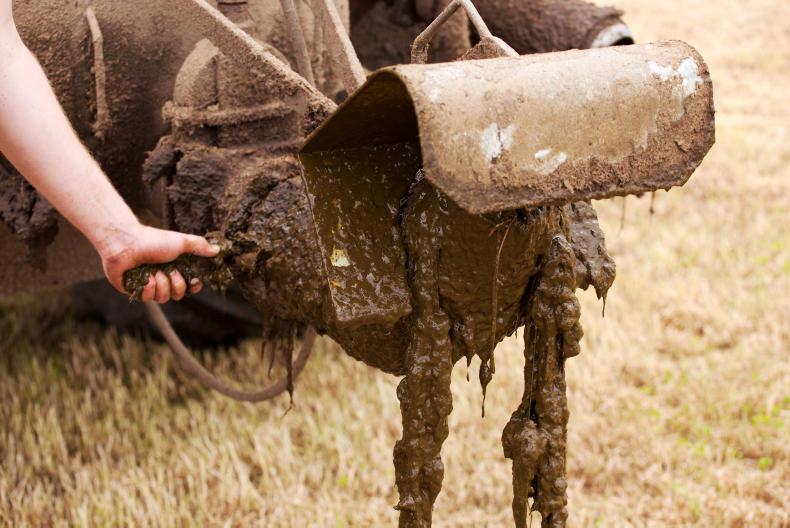Farmers and contractors could have to phase out splash plate slurry spreading to reduce air pollution, according to a consultation paper published by the Minister for Communications, Climate Action and the Environment Denis Naughten.
The public consultation on Ireland’s proposed clean air strategy closed last week and focused on air pollutants other than greenhouse gases, such as ammonia and fine particulate matter.
The discussion paper published to inform the public consultation includes a large section on agriculture.
Targets
It warns that plans to grow agricultural production under the Food Harvest 2020 and Food Wise 2025 strategies “may lead to increased air emissions”, with agriculture already representing 98% of Ireland’s ammonia emissions. While these have remained stable in recent years, the EU has set a target of 19% less ammonia in 2030 compared with 2010.
“The splash plate technique can, depending on the timing of the application and the weather conditions, result in significant nitrogen loss to the atmosphere through ammonia volatilisation, as well as creating odour issues,” the Department paper reads, adding that trailing shoe or trailing hose spreading methods limit those effects.
It notes that splash plates have been banned in Denmark since 2001 and asks whether a date should be set for a similar ban in Ireland.
Listen to a discussion of the proposal in our podcast below:
Listen to "Proposed ban on splash plates" on Spreaker.
The IFA’s environment chair Thomas Cooney described the proposal as extremely concerning and impractical.
Teagasc research shows that efforts will be needed in farming to meet ammonia emission targets, but suggests a middle ground.
“We don’t advocate the complete removal of splash plates,” gas emissions researcher Gary Lanigan told the Irish Farmers Journal. “That would be a very expensive way of going about it.”
Read more
Climate plan to push for fertiliser switch to urea
Farmers and contractors could have to phase out splash plate slurry spreading to reduce air pollution, according to a consultation paper published by the Minister for Communications, Climate Action and the Environment Denis Naughten.
The public consultation on Ireland’s proposed clean air strategy closed last week and focused on air pollutants other than greenhouse gases, such as ammonia and fine particulate matter.
The discussion paper published to inform the public consultation includes a large section on agriculture.
Targets
It warns that plans to grow agricultural production under the Food Harvest 2020 and Food Wise 2025 strategies “may lead to increased air emissions”, with agriculture already representing 98% of Ireland’s ammonia emissions. While these have remained stable in recent years, the EU has set a target of 19% less ammonia in 2030 compared with 2010.
“The splash plate technique can, depending on the timing of the application and the weather conditions, result in significant nitrogen loss to the atmosphere through ammonia volatilisation, as well as creating odour issues,” the Department paper reads, adding that trailing shoe or trailing hose spreading methods limit those effects.
It notes that splash plates have been banned in Denmark since 2001 and asks whether a date should be set for a similar ban in Ireland.
Listen to a discussion of the proposal in our podcast below:
Listen to "Proposed ban on splash plates" on Spreaker.
The IFA’s environment chair Thomas Cooney described the proposal as extremely concerning and impractical.
Teagasc research shows that efforts will be needed in farming to meet ammonia emission targets, but suggests a middle ground.
“We don’t advocate the complete removal of splash plates,” gas emissions researcher Gary Lanigan told the Irish Farmers Journal. “That would be a very expensive way of going about it.”
Read more
Climate plan to push for fertiliser switch to urea






 This is a subscriber-only article
This is a subscriber-only article











SHARING OPTIONS: